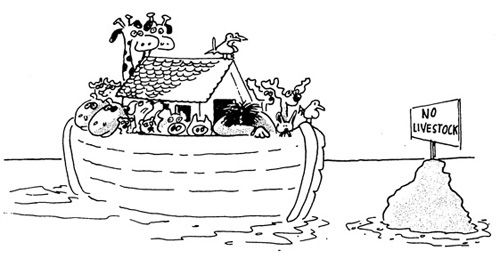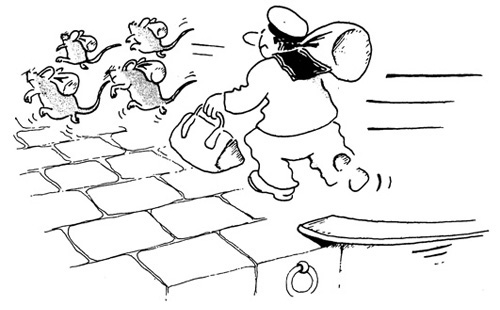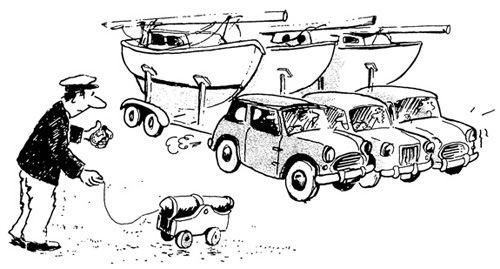Salty Dog Talk (8 page)
Authors: Bill Beavis
Press when associated with progress comes from the idea of the wind ‘pressing’ against the sails. Sailors spoke, and yachtsmen still do, of being under a ‘full press of sail’.

Pooped
The original nautical expression meant to pay for a round of drinks. Now more widely understood as to celebrate and not trouble about expense.
A shift in emphasis, another viewpoint.
Slant
was the word sailors used to describe the position of the wind relative to their ship. A good slant was a favourable wind which could be taken advantage of to steer the intended course. A slant wind, on the other hand, was less favourable although not exactly foul. The word suggested significant change although not large in measure. A subtle analogy this.
When sailing ships engaged in battle it was required that every man’s hammock be brought up on deck and tied to the netting along the ship’s rails, where they could afford protection against musket fire and splinters and also be used as life preservers. To perform both functions properly it was necessary that they be tightly rolled and it became the drill every morning for bosun’s mates to check the tightness of each man’s hammock by seeing if they would pass through a regulation-sized hoop. There was trouble for the man whose hammock did not pass ‘through the hoop’ and the expression still suggests trouble today.
Quarantine
From the Italian
quaranta
meaning forty, which was the original period which ships with infectious disease aboard were held offshore; the practice was begun in Venice during the 14th century when a Council of Health convened to draw up the ‘Quarantine Laws’. Ancient physicians ascribed many strange changes to the period of forty days. There is no medical basis for this and it seems to have more to do with the Biblical connection; forty days being the most popular period of expiation and penance. The Flood, Moses on the Mount, Jesus in the wilderness, all these lasted forty days. The most relevant though, was the forty days that Noah had to wait before opening up the doors of the Ark, perhaps that is where they got the idea.
Strictly the area of the vessel from between 45 degrees on either side of the stern; port quarter, starboard quarter. It was the part of the ship where the officers’ accommodation was situated and was known as their
quarters
. Gradually the word has come to mean lodging or billets in the military sense.
Rate of Knots
A knot is the nautical measure of speed, one nautical mile per hour. Until the mechanical log which registers the distance a ship travels came into use, speeds were calculated with a ‘chip log’ which was a long line with a triangular-shaped piece of wood at the end to anchor it in the water. At intervals of 24 ft 4 in. a knot was tied in the line; this represented 1/240 part of a mile. To calculate speed the line was allowed to run out from the ship, and at the same moment a sand glass was started. The glass was timed to 15 seconds which is 1/240 part of an hour. So as time and distance were of the same proportion the number of
knots
which passed through the operator’s hand while the glass was running was equal to the number of miles the ship was making in the hour. To do something at a ‘rate of knots’ has come to mean at high speed.

Quarantine
To walk out on a project because it seems doomed. Sailors believed that the sight of rats seen coming out of the ship’s holds was a portent of disaster. There was some substance in this since the rat frequently inhabited the bilge which was the first place to flood should the vessel be foundering. However it is something else to attribute a kind of sixth sense to a rat and get alarmed just because it leaves a ship in port. Yet in 1923 at the San Francisco Navy Yard a number of seamen did become apprehensive when rats were seen leaving the
USS Young
. The following day in an unprecedented disaster the
Young
along with six more destroyers piled up on the rocks on passage to San Diego.
During Prohibition in the USA (1920s and 30s), huge quantities of liquor were smuggled along a stretch of coastline between New York and Atlantic city. One of the most audacious and successful men engaged in this traffic was a boatbuilder from Nova Scotia called Bill McCoy. Over a period of four years he is credited with delivering over $70 000 000 of contraband whisky. Although later caught, and convicted for smuggling, McCoy was a man of integrity. He kept himself independent from the gangsters and was careful never to stray inside US territorial water – transfers were made at sea. He was proud of the fact that his activities brought prosperity to some poverty-stricken communities, but most importantly he never defrauded his customers and, at a time when adulteration was widespread and people were blinded or fatally poisoned from the effects of backstreet distilling, every bottle that McCoy brought in was 100% genuine and unblemished. Hence the suggestion of authenticity contained in the expression.
To prevent the inevitable twists and kinks which occur in ropes at the most inauspicious time, and provide greater embarrassment when handled at speed, it was found expedient to keep certain lines, such as the log and sounding line, on reels. From here the lines could be ‘reeled off’ without delay or hazard. The term was later applied to anyone who spoke fluently or was especially adept at quoting facts and figures.

Rats from a sinking ship
An Italian word, the correct spelling is
regata
and it means a boat race. In the Middle Ages it was the custom for the people of Venice to sail to the Lido to practise throwing slings. Since this was for the possible defence of the newly founded Republic the government provided boats for the trip and between them a haphazard race was begun. Subsequently it became official with the boats begun from a line. The Italian for line is
riga
and it is from this word that regatta is derived. Regattas are still very popular in Venice and take place each year.
To survive by patience and fortitude, as a vessel rides a storm. Impossible to go forward or run before it the ship lowers or shortens her sail and rides the waves until the storm abates. A vessel also ‘rides’ to her anchor, although this may be because the old-fashioned word for anchor was
roding
, thought to derive from roadstead, the area where craft normally anchored. The expression
let her ride
originates from here and was part of an official order to discharge the crew at the end of the voyage and ‘let the vessel ride’.
The particular arrangement of masts and sails is known as the vessel’s rig and it is by this she is recognised; jackass barque, hermaphrodite brig, mussel drudger, cutter, sloop and so on. Always on the lookout for words he can borrow, the sailor used the word to describe the clothes he was wearing and consequently there came the ‘square rig’ or the seaman’s dress with bell-bottom trousers, collar, etc., and the ‘fore and aft rig’ which is what officers wear. The word became general in the description of dress although it does seem to have made a return to its origins with the later adoption by the oil industry.
The Latin name for the ram fitted to the bow on early Mediterranean ships was
rostra
. In 338 BC after a successful Battle of Actium the Romans took some of the rostra from captured vessels as souvenirs, carried them home to Rome and displayed them in front of the speaker’s stage in the Forum. Gradually the entire assemblage took on the name of rostra. How the plural rostra was changed to the singular rostrum nobody knows!
A petition popularised by sailors who, fearful that the names at the top of the list might be held as the ringleaders, wrote their names in a circle. However, credit for the original idea must go to officers of the French government who in complaint wrote their names on the sash or ribbon worn with their tunics. Round is a corruption of the French
rond
; robin a corruption of
ruban
(ribbon).
From the French
arrumer
which means to pack closely. The word was common in the 16th century and described the method of cargo stowage and later the cargo itself. Its later meaning, to poke about, ransack, turn over roughly or jumble, is thought to have come from the warehouses and quayside where cargo was stored awaiting shipment. Such a variation of items and materials, frequently intended for different destinations, would have needed some sorting out.

Regatta
Originally a military punishment first recorded in Sweden; gauntlet being a corruption of the Swedish
gatlopp
(
gata
or gate;
lopp
running). The mode of punishment was to make the offender run between a gate or facing ranks of soldiers who would beat him with their leather belts. It entered the English language in 1661 when adopted by the Royal Navy as the punishment for stealing. Theft is a crime universally despised by sailors and there would have been no difficulty in persuading the men to partake.
Safe Passage
The word passage comes from the old French
passager
and signifies the journey a ship makes from one port to another (as opposed to voyage which is the round trip). The word
passenger
comes from here. The phrase has come to mean unharmed or unhindered. Latterly used in legislation and in government – ‘the safe passage of a bill’.
The seaman’s term for conduct just within the rules and is another analogy to the sails. A helmsman who allows the ship to come too close into the wind cannot be admonished because the sails have not begun to shake. But nevertheless they will have lost their optimum pulling power and the ship will not be making her best possible speed.
It seems a long way from salary to salt but it is from this that the word is derived … from the Roman custom of paying soldiers and sailors a quantity of salt as a part of their wages. It was known as the
salarium
from the latin
sal
meaning salt, and also gives rise to the expression
worth his salt
meaning that a man was worth his keep.